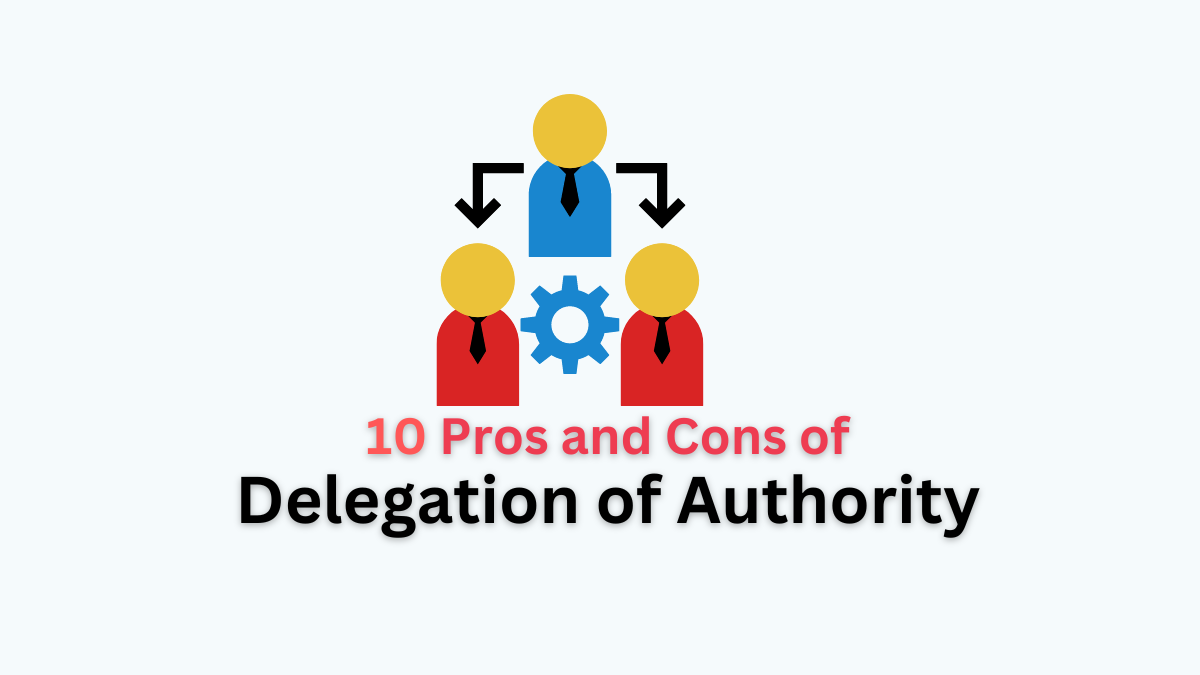Pros and Cons of Delegation of Authority
Delegation of authority is the strategic transfer of decision-making power and responsibility from managers to subordinates, enabling them to take on tasks, make decisions, and contribute to organizational goals, fostering growth, trust, and skill development within the team.
In this article, we will explore 10 major pros and cons of delegation of authority in the workplace, so let’s get started:
Pros of Delegation of Authority
Following are the five main advantages of delegation of authority in the workplace:
Enhances Efficiency and Productivity
Delegation allows managers to focus on high-priority tasks while distributing routine or specialized tasks to subordinates.
This results in better use of time and resources, leading to higher productivity across the team. By leveraging the diverse skills of team members, work can be completed more efficiently and effectively.
Promotes Employee Development
Delegation provides employees with opportunities to learn and grow. By handling new tasks and responsibilities, employees gain valuable experience and develop new skills, which prepares them for future leadership roles.
This not only benefits the individual but also creates a stronger and more capable workforce for the organization.
Boosts Motivation and Morale
When employees are trusted with additional responsibilities, it boosts their confidence and sense of importance within the organization. Feeling valued and trusted by their superiors can significantly enhance their motivation and job satisfaction, leading to a more engaged and committed workforce.
Improves Decision-Making
Delegation can speed up the decision-making process as employees are empowered to make decisions within their area of responsibility without having to seek constant approval from their superiors.
This autonomy can lead to quicker responses to challenges and opportunities, benefiting the organization as a whole.
Read More: 10 Major Pros and Cons of Product Departmentalization
Encourages Innovation
By giving employees the authority to make decisions and take on new tasks, managers can foster a culture of innovation.
Employees are more likely to think creatively and propose new ideas when they feel empowered and responsible for their work. This can lead to fresh perspectives and innovative solutions that drive the organization forward.
Cons of Delegation of Authority
Now, let’s explore the five main drawbacks of authority delegation in business.
Risk of Misuse of Power
Delegating authority to the wrong individuals can lead to misuse of power for personal gain.
Employees might exploit their new responsibilities, leading to ethical breaches, mishandling of confidential information, or other fraudulent activities. This can damage the organization’s reputation and lead to legal and financial consequences.
Read More: 10 Major Pros and Cons of Time Departmentalization
Potential for Poor Performance
Not all employees may be ready to handle the additional responsibilities delegated to them. Lack of experience, inadequate training, or insufficient guidance can result in subpar performance, errors, and project failures. This can negatively impact the overall quality of work and the organization’s performance.
Loss of Control
Delegation inherently involves transferring a certain degree of control from managers to subordinates. This can be unsettling for managers who prefer to have a tight grip on all aspects of their projects.
The fear of losing control over important tasks can lead to reluctance to delegate, thereby hindering the potential benefits of delegation.
Read More: 10 Major Pros and Cons of Job Enlargement
Risk of Delays
Delegation can sometimes lead to delays in project timelines. Subordinates may take longer to understand their new responsibilities and make decisions, especially if they are not adequately prepared or if the delegation process is rushed.
This can be particularly problematic in time-sensitive projects where delays can have significant repercussions.
Impact on Team Dynamics
Delegating authority can sometimes create tension within the team, especially if not handled sensitively.
If certain team members are given more authority, it might lead to jealousy, resentment, or feelings of favoritism among other team members. This can negatively affect team cohesion and collaboration, potentially leading to conflicts and a decrease in overall team performance.
In conclusion, delegation of authority is a powerful tool in business management, offering numerous advantages such as enhanced efficiency, employee development, increased motivation, improved decision-making, and fostering innovation. However, it also comes with significant risks, including the potential for misuse of power, poor performance, loss of control, delays, and negative impacts on team dynamics.
Read Next: 10 Major Pros and Cons of SWOT Analysis in Business
